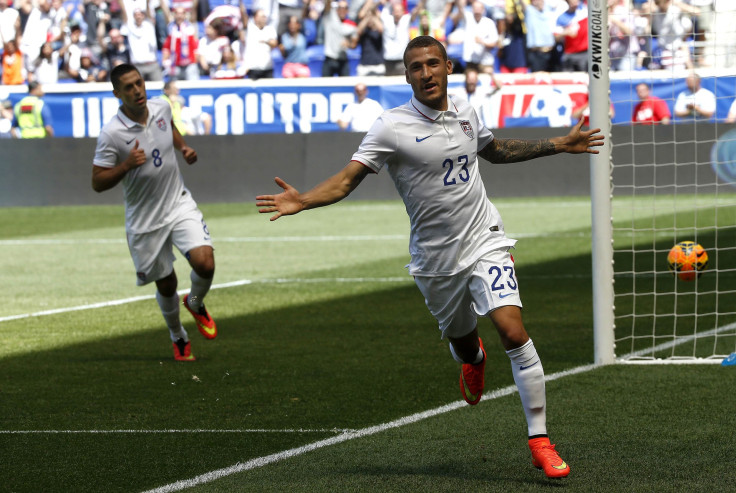USA Vs. Germany: 6 Key Players For Crucial World Cup 2014 Group G Match

The United States men’s national team showed plenty of promise in their first two World Cup games, with four points in what was widely regarded as the most competitive group in the tournament. But it could all count for nothing if the U.S. fail to get a positive result in what promises to be their toughest match to date, against Germany.
The U.S. needs a draw to ensure that they will progress to the Round of 16. A defeat will leave Jürgen Klinsmann’s side relying on Ghana and Portugal to fail to win their concurrent match by a big enough margin to overhaul the U.S. on both points and goal difference. Germany, seen as one of the favorites to lift the trophy, has their own incentives.
A draw is needed to ensure they both progress and also top the group, thus, in theory, earning a more favorable draw in the next round. It promises to be a tense affair in Recife.
Here are six players whose performances are likely to have a major influence on the result.
Fabian Johnson (USA)
Having played in midfield for much of the U.S. team’s qualifying campaign, Johnson was moved into the position he occupied regularly for his Bundesliga club Hoffenheim last season, right-back, ahead of the competition. In Brazil, he has thrived in the deeper role, which allows him to come late into the attack as a real weapon. He was certainly the standout player for the United States in the 2-2 draw with Portugal, when his ability going forward caused regular problems. Germany were vulnerable down their left side against Ghana and Johnson is capable of taking advantage.
Philipp Lahm (Germany)
Germany coach Joachim Löw had a big decision to make regarding his captain ahead of the World Cup. Should Lahm continue in his original position at full-back, an area where Germany are hardly strong, or occupy a midfield role in which he has impressed at Bayern Munich over the past season? Löw went with the latter, but thus far it has not gone smoothly. Lahm’s dallying on the ball almost led to a goal for Cristiano Ronaldo early on against Portugal. Against Ghana, he was punished when his sloppy pass was intercepted and Asamoah Gyan put the ball in the net. Such carelessness in such a crucial area of the pitch has to be eradicated.
Michael Bradley (USA)
The U.S. midfielder is the most likely to capitalize off any errors from Lahm. The Toronto FC and former Roma playmaker entered the World Cup as the best player on the U.S. roster. While Bradley didn’t fulfill that ability in an opening game against Ghana, he improved against Portugal and can now really stamp his authority on this World Cup with a commanding performance against one the competition’s best midfields. At his best, Bradley combines quality on the ball and dynamism going forward. That latter quality is even more crucial now that Jozy Altidore is injured and Clint Dempsey will again likely play as a lone forward.
Thomas Müller (Germany)
Müller, perhaps better than any other player, embodies the qualities that were for so long associated with Germany. He often doesn’t look that impressive, but is so regularly efficient when it really counts. The Bayern Munich man is not the most technically gifted of players, but a World Cup record of eight goals in as many appearances tells you all you need to know about his effectiveness. In Brazil, he has been used in a striking role but with license to roam, allowing space for his teammates to move into and causing opposition defenders headaches aplenty.
Matt Besler (USA)
The 2012 Major League Soccer Defensive Player of the Year has shown his abilities to a much wider audience so far in Brazil. Besler, 27, arrived to the international scene at a mature age, having made his debut just 18 months ago, but his performances in qualifying and now at the World Cup are seeing him take full advantage. Having hardly put a foot wrong in the first two matches, the Sporting Kansas City center-back now faces his biggest task yet against the quality and fluidity of Germany’s high-profile attackers.
Mario Götze (Germany)
Still only 22 years old, Götze has already been a major star for several years. But a year after his lucrative and controversial move from Borussia Dortmund to Bayern Munich, Gotze is now enjoying his first major tournament as a first-choice midfielder for Germany, almost four years on from his international debut. So far he has been exceptional. His intelligent running inside from his starting position on the left led to a penalty against Portugal and garnered him a goal against Ghana. All three of the goals the U.S. have conceded thus far have come via issues on its right side, and Götze will be looking to exploit any vulnerability.
© Copyright IBTimes 2024. All rights reserved.











